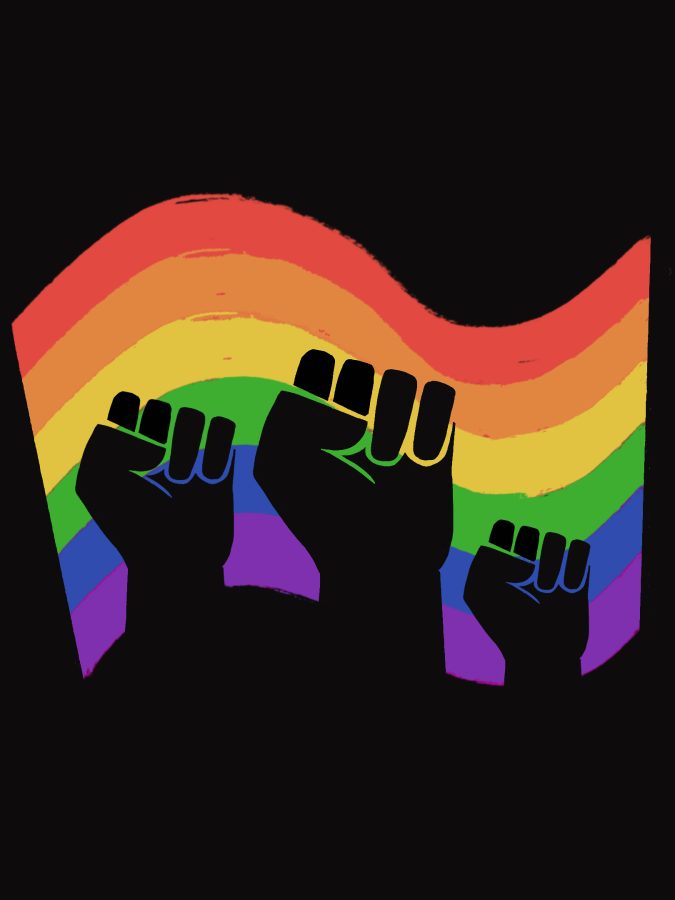To enact change of any kind, communities need to work together to help each other out. This LGBTQ+ history month, become an ally for the community, so they are not alone in their fight for change. The first step to being an ally is to learn about problems that people in this community face on a daily basis. Ask questions, and most importantly, don’t be a bystander.
There are several reasons why individuals do not raise their voices when they hear something offensive. It might be awkward if they don’t know what to say or don’t want to aggravate the issue. However, this does as much harm as the person speaking. Let the speaker know their statements are unacceptable, and it may inspire others to do the same. It can change how bystanders react and hopefully change the offenders’ actions in the future.
In an interview with a sophomore at UMass Boston, Julia Olszewski (she/her) said: “it’s all about the support, to be honest. We can’t pressure or fit people in boxes, the most important thing is to react when you think something is wrong. [The UMass Boston community] should do their part to address and discourage homophobic rhetoric anytime they see it.”
Another way to help is by speaking to a friend, family member or coworker that is a part of the community, if they are comfortable sharing their experience. Some people tend to believe that bringing up LGBTQ+ issues would offend or make others uncomfortable, so they might not bring it up themselves. Also, keep in mind that disagreeing is natural and good!
If there is no person to speak to that is part of the community, reading books on LGBTQ+ issues can be very useful. Popular nonfiction books include, “When Harry Became Sally” by Ryan T. Anderson, “Gay Bar: Why We Went Out” by Jeremy Atherton Lin, and “The Pink Triangle: The Nazi War Against Homosexuals” by Richard Plant. Reading about queer history is a huge step in becoming an ally.
If one doesn’t like to read, there are many movies or podcasts related to issues faced by the community. “Making Gay History” is podcast that delves into every aspect of LGBTQ+ history, featuring a multi-part series on themes such as “Coming of Age During the AIDS Crisis” and “The Stonewall Insurgency.”
Advocating for policies that protect people from discrimination at school, employment and other places is a huge part of allyship. If one observes or hears of an unjust rule or policy, talk to a friend or other trustworthy person about the concerns and what can be done to change it.
One of the most fundamental ways to demonstrate respect for someone in the LGBTQ+ community is to ask for, and accurately use, their pronouns. When someone is addressed with the incorrect pronoun, they may feel disrespectful, ignored, rejected, ostracized or aversive.
Regardless of sexual orientation or gender identity, anyone may be an ally. Partners are valuable and appreciated, as they may be successful and strong advocates for equality, not only making it easier for individuals to come out, but also helping others understand the value of equality and justice for all people.
The Queer Student Center is a great resource for those interested in pursuing allyship. They assist the educational and social growth of gender and sexual minority communities. This is achieved through creating a welcoming safe place that supports all UMass Boston students’ requirements for personal identification and boundaries, regardless of sexual orientation, gender, gender expression, ethnicity, age, class, religion or physical ability. QSC is located on the Campus Center’s third floor, or students can email them at [email protected].
How to be an ally to the LGBTQ+ community
An LGBTQ+ flag depicted with raised fists. Illustration by Bianca Oppedisano / Mass Media Staff
Contributors
Vansh Khokhani, Arts Writer
Bianca Oppedisano, Illustrator

